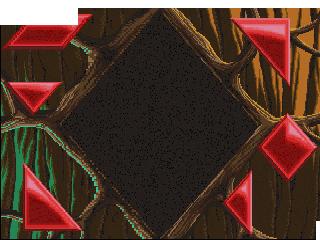
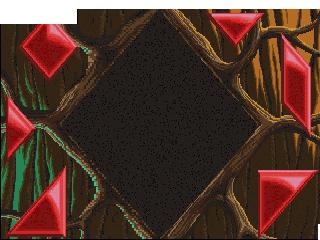
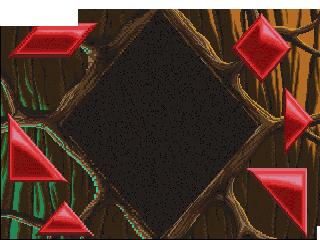
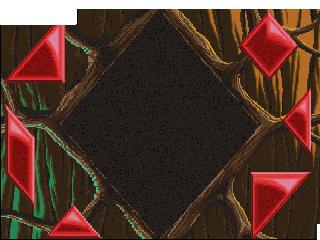
Copyright © 2004 Balmoral Software (http://www.balmoralsoftware.com). Portions copyright © 1995 Philips Interactive Media, Inc. All rights reserved. Republication, redistribution or conversion is expressly prohibited without the prior written consent of Balmoral Software.
Merlin's Apprentice is being offered as copyrightware. For more information, visit Cliff Johnson's web site at www.fools-errand.com.
The single saved-game file acts like a status file - it gets updated with the current progress of the game - so be sure to copy the %WINDIR%\MERLIN.DAT file if you want to return to a fixed point in the game. The saved-game file includes the current status of up to twelve ongoing games, each of which can be played independently of the others using a unique game piece. A main menu selection allows you to monitor your progress with each of the game pieces.
This game runs under Windows 95, but not under Windows 2000.
Several different types of puzzles in five general categories are included in each game. Categories as defined in the game difficulty settings are: Words, Shapes, Action, Memory and Logic. For additional information on each puzzle, refer to the online help available within the puzzle.
This type of puzzle involves targets moving across the screen. The object of the puzzle is to click the targets faster than they disappear at the screen margins. One or more sets of seven colored diamonds are awarded as targets are clicked, but diamonds are lost if too many targets escape. Different sounds accompany winning or losing a diamond. The rate at which targets appear increases with the difficulty level of the puzzle, as does the number of diamond sets required for completion. One strategy that is often successful is to keep the mouse cursor along one side of the screen and minimize mouse motion as much as possible by leaving the cursor in a hit zone and allowing occasional targets to pass without being clicked. This keeps the mouse motion in a relatively-small two-dimensional range rather than having to cover the entire screen.
A letter substitution puzzle. Solving for shorter words and observing the effects of changes may make solutions easier.
These jigsaw-style puzzles vary in size from 6 to 13 pieces, and range in difficulty from easy to quite challenging. The goal is to unscramble a jumbled picture by cycling the position of two or more pieces using either side of four control symbols. Each side of a control symbol undoes the operation of the other side. Solution sequences consist of control symbols identified by index, with L or R to indicate which side of the symbol is pressed. The side portion of the symbol is omitted if each side produces an equivalent rearrangement of pieces, such as exchanging two pieces. Symbol indices are shown next to a matrix of piece positions used to identify the location of a distinguishing piece in the random puzzle arrangements. Some locations in the matrix may not be occupied by puzzle pieces.
Click on the symbols in the order they're flashed. Distinctive sounds are made as each symbol is lit. Three shapes are added to the sequence at each stage of the puzzle. Longer sequences are required at higher difficulty levels. To help complete these puzzles, the solution sections below contain image sheets that can be printed out and numbered as sequences are disclosed. These sheets also help identify items that haven't been previously selected. The game cursor can be used to identify one of the three new symbols added at each stage. To view the sequence obtained so far, click on an incorrect symbol.
Press each symbol or symbol quadrant one or more times in order to achieve the desired pattern or color.
Arrange the pieces so that they fit inside the solution area. Each piece is shown at half the size it occupies within the solution area. One of the pieces in each puzzle remains unused.
Potion [Logic]
Six to twelve objects must be selected in the correct order. The online puzzle help indicates which of these objects must be selected last. Combining each pair of the original objects results in the creation of a new object, which is then combined with additional original objects to create further new objects until the sequence is complete. The key to solving this type of puzzle is to realize that if the correct sequence of new objects is known, the sequence in which the original objects are chosen can be determined by relatively few comparisons of pairs of original objects. Let A and B be original objects whose combination creates the new object Z. If Z is not the first new object in the sequence, then in the true sequence Z must be followed by (combined with) either A or B. If this were not the case, we could start the sequence at the beginning with A B and obtain Z earlier in the sequence than allowed. By continuing the sequence from Z using the remaining original objects, we could arrive at the final new object without using up all the original objects. Since the puzzle structure requires all original objects to be used, we conclude that in the true sequence, the combination A + B must be followed either by A or by B if said combination is not the first new object in the sequence (that is, if A B are not in fact the first two original objects in the true sequence).
So we can go through combinations of two original objects and note which new objects they produce, ignoring cases where the new object is the first in the sequence. For example, say A + B produces Z. Then we make a note that in the true sequence, Z must be followed by A or B. When we find another pair of original objects that produces Z, we can rule out one of the original two possibilities and now know the one original object that follows Z. Further tests of of original pairs can exclude this identified object, which significantly reduces the number of cases we need to consider. If all new objects have not been identified in this way, as is the case with the easier-mode puzzles, we can simply go through the sequence of unused original objects in order.
The logic of this approach is best seen by means of an example. Suppose we have an Advanced-mode Level 2 potion with 9 original objects and known new-object sequence A B C D E F (ignoring the last combination for which the following original object is already known). Number the original objects by 1 - 9, with #4 excluded since it is known to be the last object. Create a table for new objects:
C D E FHere, we've excluded the first two new objects A and B since Advanced-mode puzzles allow multiple paths to these objects. We will systematically compare pairs of original objects, updating the new-object table and making exclusions as we go. The puzzle is reset after every pair of objects is examined. First we note that the combination 1 2 produces F, so we know that F must be followed by 1 or 2 (we don't yet know which), and we can update our table:
C D E F 1 2Next, we find that 1 3 also produces F, so the only possibility for the original object that follows F must be 1 since [(1 or 2) and (1 or 3)] is 1:
C D E F 1This also means that any further combinations involving original object 1 need not be considered. The next pair in order is 2 3, which produces D. We also exclude combinations involving original object 4 since we know that one comes last, so the next pairs are 2 5, which produces E, and 2 6, which produces C:
C 2 6 D 2 3 E 2 5 F 1Combinations 2 7, 2 8 and 2 9 each produce A, which is ignored since it is the first new object in the sequence. Combination 3 5 produces E, so E is followed by 5 and we exclude further combinations involving 5:
C 2 6 D 2 3 E 5 F 1Similarly, combination 3 6 produces D and combination 6 7 produces C:
C 6 D 3 E 5 F 1Remaining combinations 7 8, 7 9 and 8 9 each produce A and are ignored. We haven't found 2, 7, 8 and 9 by this method, so we can test which sequence involving these four original objects produces the correct third new object C. The first such sequence that we find can be used - there may be other starting sequences that produce the desired result if the puzzle has more than one solution. In our example, we find that
2 7 8 9 = Cso one final solution sequence is
2 7 8 9 6 3 5 1 4and there are multiple variants of the solution with different orderings of the first four objects.
Of course, the trick to this approach is knowing the correct intermediate sequence of new objects (disclosed in the solutions below). More combinations can be tested with the first puzzle at each level to determine this sequence. A table can be used to keep track of results from combinations of original and new objects. For the above example, such a table would appear as
1 2 3 5 6 7 8 9 1 F F F F F F F 2 D E C A A A 3 E D D D D 5 E E E E 6 C C C 7 A A 8 A F E E E E E E E D C C E C C C C C E D D D F D D D D C B B B B D B B B A X B X X X B B B B A C A A A C C Cwhere X represents annihilation. Filling in the lower rows of this table can be easier by clicking again on a new object to undo the last combination and pick a new original object. Animations can be skipped using the spacebar. We're looking for gaps or patterns in the table that will indicate a solution sequence. In the above table, for example, there are no combinations of fewer than seven original objects producing F that don't use object 1, so we can assume that the final new object (a green asteroid for Level 2 potions) is produced by combining new object F with original object 1. Only object E produces F (in combination with object 5), so we can work backwards in the table to arrive at a solution sequence.
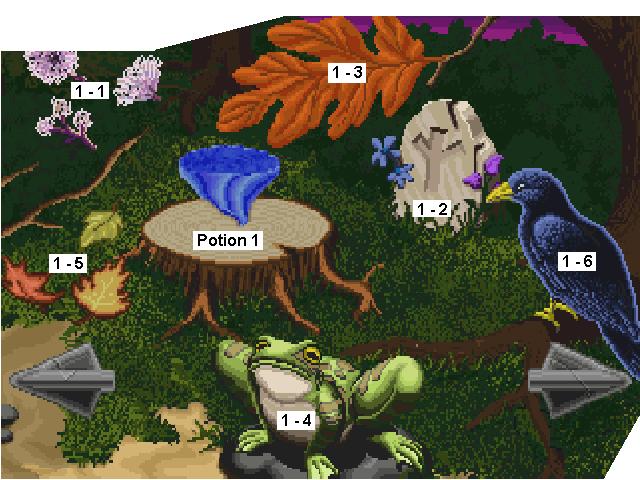
1-1 | 1-2 | 1-3 | 1-4 | 1-5 | 1-6 | Level 1 Potion
An arcade game involving falling dandelion seeds.
| Beginner mode: | 7 blue diamonds |
| Advanced mode: | 7 blue diamonds + 7 red diamonds |
| Expert mode: | 7 blue diamonds + 7 red diamonds + 7 green diamonds |
A cryptogram puzzle with various letter patterns in stone.
Beginner mode:
# # # ####
##### ###### ##### ######
#### ##### ##### ## ####
#### #### ## ##### ## ###
#### # #### #### # ####
#### #### #### ####
Solution Solution Solution Solution
Advanced mode:
#### ### ### ## ##
#### ##### ###### ###
##### ## ### ### ######
### ###### #### #### ##
##### ### ## ## ######
#### ##### ##### ## ###
Solution Solution Solution Solution
Expert mode:
### ### ### ####
##### ##### ##### #####
### #### ## ### ####
###### ## ### ##### ######
#### #### ## ###### ####
##### #### #### #####
Solution Solution Solution Solution
Puzzle 1-3
A 3 x 2 slider puzzle of an autumn leaf.
Layout:
A B 1
C D 2
E F 3
4
Mode Stem Position Optimum Solution
Beginner A EAFBDC 1R 4 3 1R 4 2
B BEFCDA 2 1L 4 1L 3
F FCDBAE 4 3 1R 4 2 1L
E DCABEF 3 1L 3 1L 2 1L
Advanced A ECDBAF 2 1L 4 3L 4
B CEBDFA 4 1R 2 1R
F FCADBE 1L 2 1L 4
E FCBAED 3L 4 1R 4 2
Expert A EDBACF 3 1R 4 1R 3 1L
B BECAFD 2 1L 2 1L 4 1R
F ACFBDE 4 2 1L 4
E FADCEB 3 1L 3 1R 2
Puzzle 1-4
A Simon Says puzzle involving frogs and other forest creatures.
| Beginner mode: | 12 symbols |
| Advanced mode: | 15 symbols |
| Expert mode: | 21 symbols |

Open image in separate window for printing
An arcade game involving falling leaves.
| Beginner mode: | 7 blue diamonds |
| Advanced mode: | 7 blue diamonds + 7 red diamonds |
| Expert mode: | 7 blue diamonds + 7 red diamonds + 7 green diamonds |
A 4 x 2 slider puzzle with one unused piece (position G).
Layout:
A B 1
C D 2
E F 3
G H 4
Mode Head Position Optimum Solution
Beginner E * FHEDABGC 4L 4L 3 2 1 4L 3 4L 1
F CFHEDAGB 4L 4L 3 1 4L 2 4L 4L 3
C ECABHFGD 4L 3 2 4R 3 1 4L 4L 3
E ** FDEHABGC 4L 4L 3 2 4L 4L 1 4R 3 4R
*: Tail feathers in position B
**: Tail feathers in position D
Mode Foot Position Optimum Solution
Advanced A ECBDFAGH 3 1 2L 1 2L
C FBEHADGC 1 2L 3 4R 3 2L 4R
H DFHACBGE 2L 4R 3 1 4R
D CBFEDAGH 4L 3 4R 3 2R 3
Mode Head Position Optimum Solution
Expert B EADBHFGC 4L 4L 2 4L 2 4L 4L 4L 3
A AEHFCBGD 4L 2 4L 4L 3 4L 4L 3
F CBDFHAGE 3 1 4L 4L 1 4R 2
C FCABDHGE 4L 4L 4L 3 4R 4R 2
Level 1 Potion Puzzle
Original objects:
1 2 3 4 5 6
Intermediate object sequence:
Pile of rocks
Blue rock
Red-yellow rock
Ruby
Mode Solution Sequences
Beginner 3 4 6 2 5 1
3 6 5 4 2 1
2 3 4 5 6 1
2 3 6 5 4 1
2 6 5 4 3 1
Advanced 3 5 2 6 4 1
5 6 2 4 3 1
4 6 2 3 5 1
4 6 3 5 2 1
4 5 3 2 6 1
Expert 3 4 6 5 2 1
3 5 4 2 6 1
2 5 3 6 4 1
2 6 5 4 3 1
4 6 2 3 5 1

2-1 | 2-2 | 2-3 | 2-4 | 2-5 | 2-6 | 2-7 | 2-8 | 2-9 | Level 2 Potion
An arcade game involving falling snowflakes.
| Beginner mode: | 7 blue diamonds + 7 red diamonds |
| Advanced mode: | 7 blue diamonds + 7 red diamonds + 7 green diamonds |
| Expert mode: | 7 blue diamonds + 7 red diamonds + 7 green diamonds + 7 yellow diamonds |
An alignment puzzle involving four planets.
Number of iterations
Mode Mars Location Earth Mars Jupiter Saturn
Beginner 3:00 4 2 3 1
4:00 1 3 2 4
2:00 2 3 1 4
12:00 4 1 3 2
Advanced 12:00 2 3 1 4
2:00 4 1 3 2
4:00 4 2 3 1
3:00 1 3 2 4
Expert 12:00 4 1 3 2
3:00 4 2 3 1
5:00 3 2 4 1
2:00 3 1 4 2
Puzzle 2-3
A cryptogram puzzle with various letter patterns on scrolls:
Beginner mode: ### ###### ### #### # ##### ### ### ###### ## ### ###### ### ##### ###### ### ####### ## ###### ##### ### ###### ### #### ###### ######## Solution Solution Solution Solution Advanced mode: #### ### ### # ######## ### ##### ######### ####### ###### ## ##### ### ######### ###### ### #### ## ## ## ##### #### ##### ###### ### #### #### ## ### ### Solution Solution Solution Solution Expert mode: ### ##### # ###### ## ### #### ## ## ### ### ####### ###### ## ### #### ### ###### ######## # ####### ########## ######## ## ###### #### #### ### ##### ### #### Solution Solution Solution SolutionPuzzle 2-4
An arcade game involving floating bubbles.
| Beginner mode: | 7 blue diamonds + 7 red diamonds |
| Advanced mode: | 7 blue diamonds + 7 red diamonds + 7 yellow diamonds |
| Expert mode: | 7 blue diamonds + 7 red diamonds + 7 yellow diamonds + 7 green diamonds |
A 4 x 2 slider puzzle of a dinosaur skeleton.
Layout:
A B 1
C D 2
E F 3
G H 4
Collarbone/
Mode Neck Position Optimum Solution
Beginner B EDACGFBH 1L 1L 3 2 1R 4 2 1R 2 1R
H FCEAHGBD 1R 4 2 1R 3 1R
G GHFCEADB 1R 2 1L 2 1L 4 1L 1L
A DBCGFEHA 4 3 1L 4 1L 1L 4 1L 1L
Advanced G EABHGFDC 4 1L 1L 2 3R 4 3L 3L 4 3L
A DGBEAHFC 4 3L 3L 2 1R 4 1R 4 3R 4
B EDFHGCBA 4 3L 3L 4 1L 4 2 1L 4 3L
H GEAFHCBD 4 1L 2 3R 4 1L 1L
Expert A DACFBEGH 3 4L 2 4L 1 4R 4R 1
B HDCAGEBF 4L 3 4L 1 4L 3 1 4L
H EBHCFAGD 4L 3 2 4R 3 2
G FBCHAGDE 1 4R 1 4R 2
Puzzle 2-6
A 3 x 3 slider puzzle with one unused piece (position A).
Layout:
A B C 1
D E F 2
G H I 3
4
Mode Rattle Position Optimum Solution
Beginner C AFDEHBICG 4L 1L 4L 1L 4L 3 2L 4R 2L 1L
I AGCBHFIED 3 2R 4R 3 2R 4L
G AEHBICDGF 3 1L 4R 2R 4R
B ADBHFIGEC 3 1L 2R 4L 2R 4L 3 1L
Advanced I ACIBEHGFD 2R 3R 1L 2R 3R 2R
B ADEFHBGCI 4R 1R 4L 2R 3L
C AEDBGIHCF 4L 2R 4L 1R 2R 3R 2L
I AFIBEHCGD 3L 1R 4L 1R 2R 3R
Expert B ADGCIEHFB 1L 1L 1L 4 2L 3R 1L 3L
C AEDHCBFIG 2R 3R 1L 4 1L 1L
I AEGHBFCID 3R 1R 2R 1R 2L 1R
G AGFHCBDEI 4 3L 1R 4 2R 1L
Puzzle 2-7
A polyomino puzzle on a diamond-shaped background:
Beginner Mode
 |
 |
| Solution | Solution |
 |
 |
| Solution | Solution |
 |
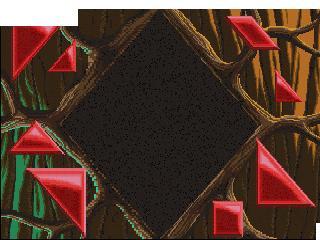 |
| Solution | Solution |
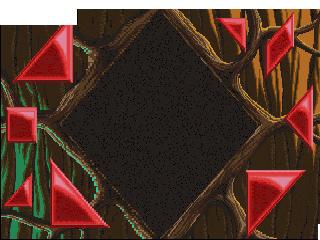 |
 |
| Solution | Solution |
 |
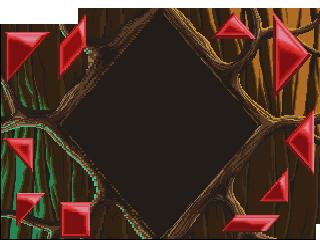 |
| Solution | Solution |
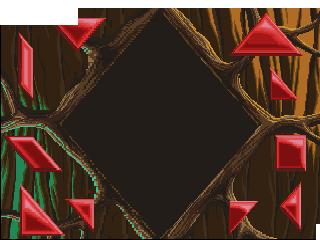 |
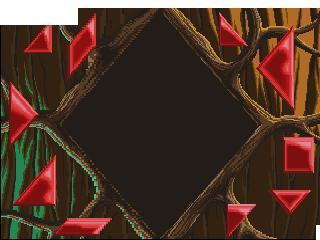 |
| Solution | Solution |
A Simon Says puzzle involving potion bottles.
| Beginner mode: | 15 symbols |
| Advanced mode: | 21 symbols |
| Expert mode: | 27 symbols |

Open image in separate window for printing
A polyomino puzzle on a rectangular background:
Beginner Mode
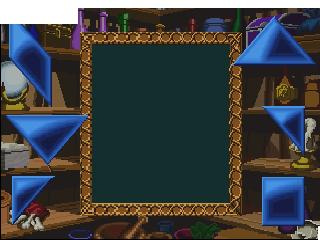 |
 |
| Solution | Solution |
 |
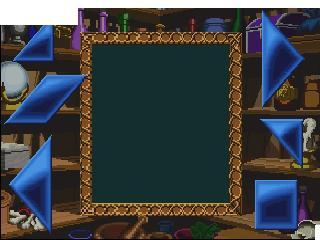 |
| Solution | Solution |
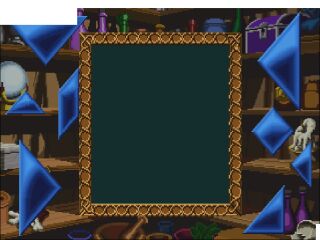 |
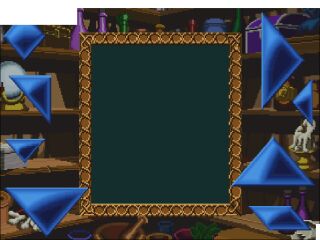 |
| Solution | Solution |
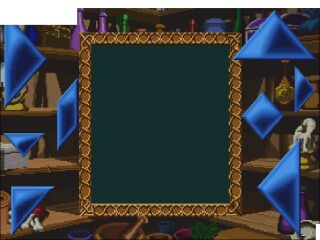 |
 |
| Solution | Solution |
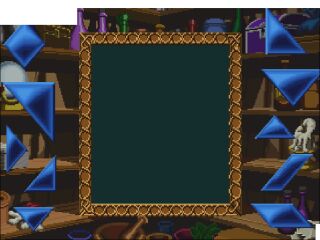 |
 |
| Solution | Solution |
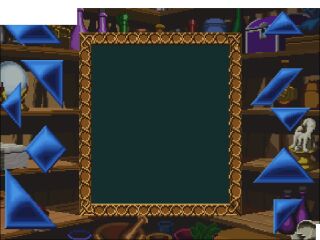 |
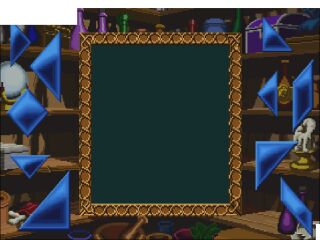 |
| Solution | Solution |
Original objects:
1 2 3 4 5
6 7 8 9
Intermediate object sequence:
Mercury (red)
Venus (blue-green)
Earth
Mars (red-yellow)
Jupiter
Saturn
Green asteroid
Mode Solution Sequences
Beginner 1 2 3 5 6 7 8 9 4
9 8 7 6 3 2 5 1 4
5 6 1 3 7 9 2 8 4
9 8 7 3 2 1 6 5 4
9 8 7 6 5 1 3 2 4
9 8 5 3 1 2 7 6 4
1 2 5 6 7 8 9 3 4
9 8 2 3 5 6 1 7 4
Advanced 5 6 7 8 9 1 3 2 4
2 3 5 9 1 8 7 6 4
1 2 7 6 8 5 9 3 4
8 9 3 6 5 2 1 7 4
3 5 1 7 2 6 8 9 4
8 9 7 2 6 3 5 1 4
5 6 1 9 3 7 2 8 4
2 3 8 1 7 9 6 5 4
Expert 7 9 8 2 6 3 5 1 4
1 9 5 6 3 7 2 8 4
1 8 2 3 7 9 6 5 4
5 8 6 7 9 1 3 2 4
2 5 3 9 1 8 7 6 4
2 6 7 1 8 5 9 3 4
3 6 9 8 5 2 1 7 4
3 7 1 5 2 6 8 9 4
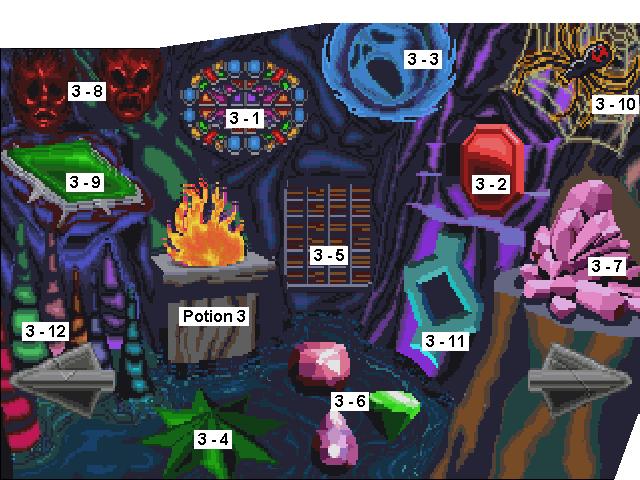
3-1 | 3-2 | 3-3 | 3-4 | 3-5 | 3-6 | 3-7 | 3-8 | 3-9 | 3-10 | 3-11 | 3-12 | Level 3 Potion
An alignment puzzle involving four quadrants of a stained-glass window.
Quadrant layout:
4 1
3 2
Color sequence:
Red/Blue
Blue/Green
Red/Yellow
Multi-colored
Quadrant color & Number of iterations
Mode Quadrant 1 Quadrant 2 Quadrant 3 Quadrant 4
Beginner Red/Blue Blue/Green Blue/Green Multi-colored
1 iteration 2 iterations 3 iterations 3 iterations
Blue/Green Red/Blue Multi-colored Blue/Green
3 iterations 3 iterations 2 iterations 1 iteration
Multi-colored Blue/Green Red/Blue Blue/Green
3 iterations 1 iteration 3 iterations 2 iterations
Blue/Green Blue/Green Multi-colored Red/Blue
2 iterations 3 iterations 3 iterations 1 iteration
Advanced Blue/Green Blue/Green Red/Yellow Red/Blue
2 iterations 1 iteration 3 iterations 3 iterations
Multi-colored Blue/Green Red/Blue Red/Blue
2 iterations 3 iterations 3 iterations 1 iteration
Red/Blue Red/Blue Multi-colored Multi-colored
1 iteration 3 iterations 2 iterations 3 iterations
Blue/Green Blue/Green Red/Blue Blue/Green
3 iterations 2 iterations 3 iterations 1 iteration
Expert Red/Yellow Blue/Green Blue/Green Blue/Green
3 iterations 3 iterations 2 iterations 1 iteration
Multi-colored Multi-colored Red/Yellow Multi-colored
1 iteration 2 iterations 3 iterations 3 iterations
Red/Blue Red/Yellow Blue/Green Multi-colored
1 iteration 3 iterations 3 iterations 2 iterations
Blue/Green Red/Blue Red/Yellow Red/Blue
2 iterations 1 iteration 3 iterations 3 iterations
Puzzle 3-2
A polyomino puzzle on an octagonal background:
Beginner Mode
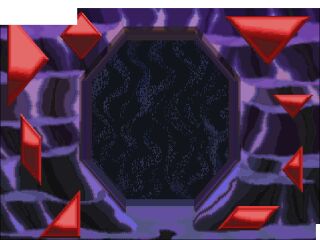 |
 |
| Solution | Solution |
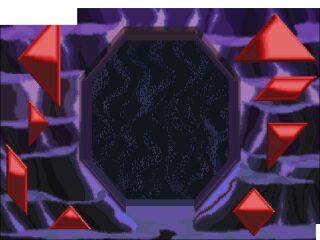 |
 |
| Solution | Solution |
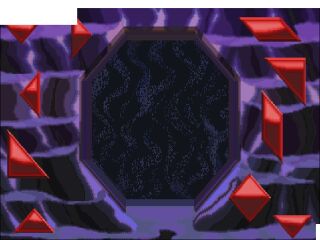 |
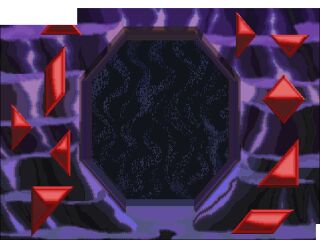 |
| Solution | Solution |
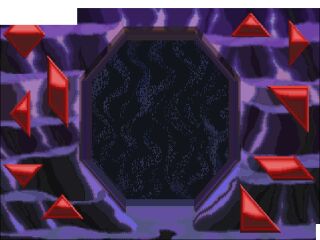 |
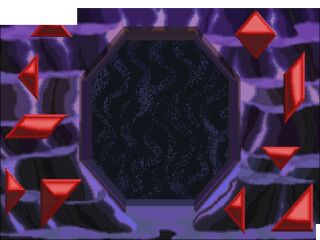 |
| Solution | Solution |
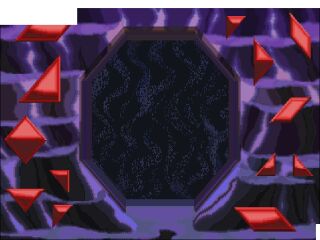 |
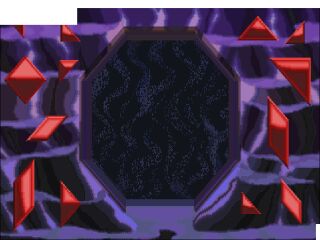 |
| Solution | Solution |
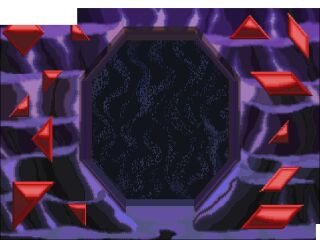 |
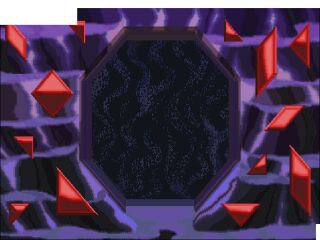 |
| Solution | Solution |
An alignment puzzle involving the correct placement of nine ghostly heads.
Layout:
1 2 3 4
5 6 7 8 9
Mode Solution sequence(s)
Beginner 1 2 3 4 5 6 6 7 8 9
Advanced 1 3 4 5 6 6 7 8
Expert 1 5 7 8
1 4 5 7 8 9
Puzzle 3-4
An alignment puzzle involving four colored quadrants of a star.
Quadrant layout:
4 1
3 2
Color sequence:
Green
White
Red
Blue
Yellow
Purple
Quadrant color & Number of iterations
Mode Quadrant 1 Quadrant 2 Quadrant 3 Quadrant 4
Beginner Yellow Green Red White
4 iterations 4 iterations 5 iterations 2 iterations
Purple Green Green White
3 iterations 5 iterations 4 iterations 2 iterations
Purple Green Blue Red
3 iterations 4 iterations 5 iterations 2 iterations
White Green White Red
3 iterations 2 iterations 5 iterations 4 iterations
Advanced White White Yellow Purple
3 iterations 2 iterations 5 iterations 1 iteration
Purple Red Blue Red
3 iterations 1 iteration 2 iterations 5 iterations
Red Red Blue Purple
3 iterations 1 iteration 5 iterations 2 iterations
White Yellow White Red
3 iterations 5 iterations 2 iterations 1 iteration
Expert Purple White Yellow Purple
5 iterations 2 iterations 1 iteration 5 iterations
White Yellow White Red
3 iterations 5 iterations 2 iterations 1 iteration
Purple White Green White
3 iterations 2 iterations 1 iteration 5 iterations
White White Yellow Purple
3 iterations 2 iterations 5 iterations 1 iteration
Puzzle 3-5
This alignment puzzle involves opening all eight parts of a locked gate.
Row layout: 1 2 3 4 5 6 7 8 Click on the wall next to the gate to get the positions of a blind row. Mode Press rows Beginner 1 1 2 3 3 4 5 5 6 7 7 8 Advanced 2 2 2 4 4 4 6 6 6 8 8 8 Expert 1 1 1 2 2 2 3 3 3 4 4 4 5 5 5 6 6 6 7 7 7 8 8 8Puzzle 3-6
An arcade game involving floating jewels.
| Beginner mode: | 7 purple diamonds + 7 red diamonds + 7 yellow diamonds |
| Advanced mode: | 7 purple diamonds + 7 red diamonds + 7 yellow diamonds + 7 blue diamonds |
| Expert mode: | 7 purple diamonds + 7 red diamonds + 7 yellow diamonds + 7 blue diamonds + 7 green diamonds |
A 3 x 5 slider puzzle with two unused pieces (positions A and E).
Layout:
A B C D E 1
F G H I J 2
K L M N O 3
4
Note: Solution sequences for this puzzle may not be optimal.
Beginner Mode
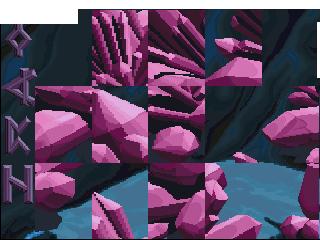 |
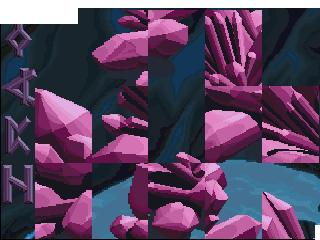 |
| 3R 3R 2R 1L 2R 3L 1L 3L 2R 1L 3L 4L 4L 1R 2L 3L 3L 4R 4R 1R 4R 1L 4R 2R 1R 4L 1L 2L 1R 4L 4L 2R 1R 2L 1L 2R | 1R 3L 3L 1L 2R 3L 3L 1L 3L 4L 4L 1R 3L 3L 2L 1R 4L 1L 4L 1R 4R 1L 4L 1R 4L 1L 4L 1R 4R 1L 4L 2L 1R 2R 1R 2L 1L 4L 4L 2L |
 |
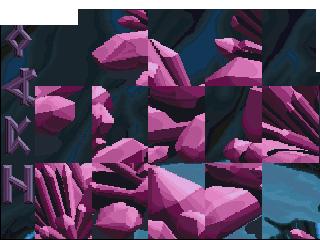 |
| 3R 1L 4R 4R 3L 3L 1R 3R 3R 2L 1R 4L 1L 4L 1R 4R 1L 4L 1R 4L 1L 2L 1R 4R 4R 2R 1R 2L 1L | 4R 4R 1R 3L 2R 1L 3L 3L 1R 3R 1L 3L 4L 1R 3L 2L 1L 3L 3L 1R 4L 1L 2R 1R 4L 1L 4L 1R 4R 1L 4L 2L 1R 4L 1L 2R 1R 4L 4L 2R 1R 2L 1L 2L |
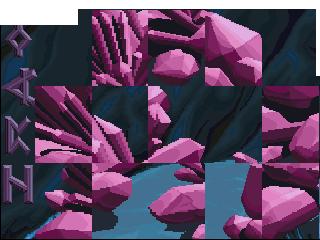 |
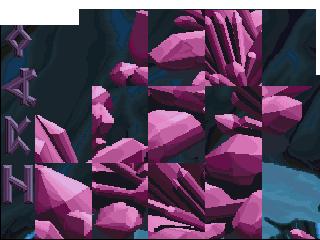 |
| 3L 4L 4L 1R 3L 3L 2L 1L 4R 4R 2R 1R 4L 4L 1L 2R 1R 2L 1R 2R 1L | 4L 1R 3L 1L 3L 4R 4R 1R 3L 1R 3L 1L 3R 2R 1R 4L 4L 1L 4L 4L 1R 4R 1L 2L |
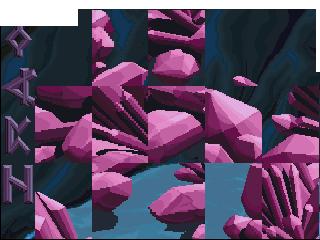 |
 |
| 1L 3R 3R 1L 3R 1R 3L 4L 1R 3L 2L 1L 3R 4R 1R 4R 4R 1L 4R 2L 1R 4L 1L 2R 1R 4R 2L 1R 2R 1L 2L | 2R 1L 3R 3R 1L 3R 1R 3L 4L 4L 1R 4L 4L 2R 1R 4R 2L 1R 2R 1L 2R |
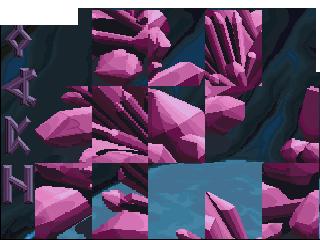 |
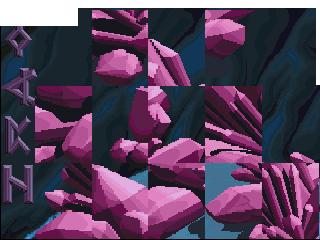 |
| 4L 2L 4L 4L 2R 3R 4L 4L 4L 2R 4L 4L 4L 4L 3R 2L 4R 3R 4L 4L 4L 4L 4L 1R 2R 4L 2L 4R 2L 4R | 1L 2R 4L 2L 3L 4L 4L 4L 4L 1L 2L 4R 4R 4R 1L 4L 4L 4L 4L 1R 4L 3L 4R 4R 4R 2R 3L 4L 4L 4L 4L 4L 1R 2R 4R 1L 4L 4L 2L 4R 4R 4R 4R 3L 4R 3L 2R 4R 3L 2R 4L 3L 2L 4L 3R |
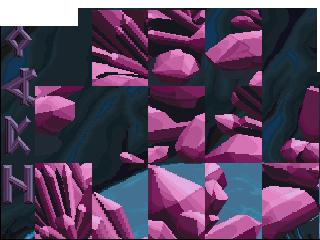 |
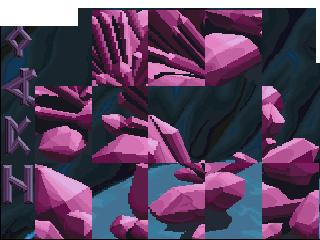 |
| 4R 4R 2R 4L 1R 4L 3L 4L 2L 4R 2R 3R 4R 4R 2R 4L 3L 4R 3R 4R 2L 4L 3L 2L 4L 3R 4R 3L 4L 3R 4R 3L 2R | 1R 2L 1R 4R 4R 2R 4R 1R 4R 2R 3R 4L 2L 4R 2L 3R 4L 4L 2L 3R 4L 3R 4R 2R 4R 3L 4L 3L 4R |
An arcade game involving daemon heads.
| Beginner mode: | 7 purple diamonds + 7 red diamonds + 7 yellow diamonds |
| Advanced mode: | 7 purple diamonds + 7 red diamonds + 7 yellow diamonds + 7 blue diamonds |
| Expert mode: | 7 purple diamonds + 7 red diamonds + 7 yellow diamonds + 7 blue diamonds + 7 green diamonds |
A polyomino puzzle on a parallelogram background:
Beginner Mode
 |
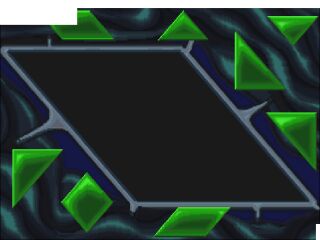 |
| Solution | Solution |
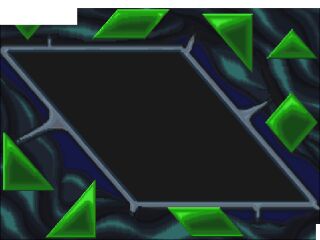 |
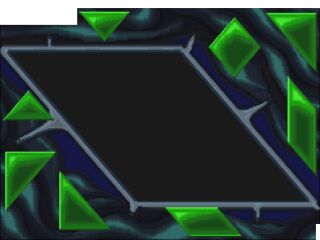 |
| Solution | Solution |
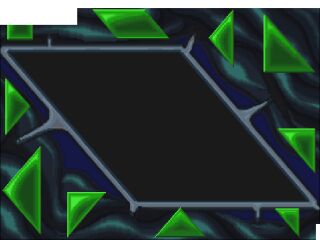 |
 |
| Solution | Solution |
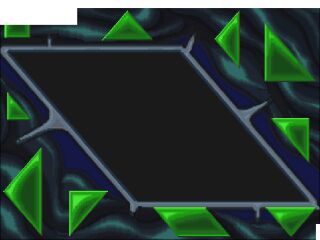 |
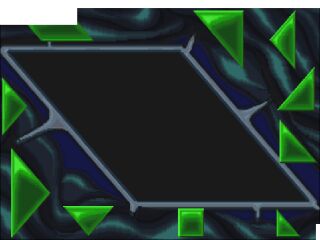 |
| Solution | Solution |
 |
 |
| Solution | Solution |
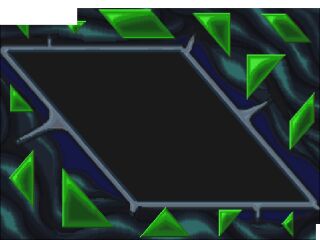 |
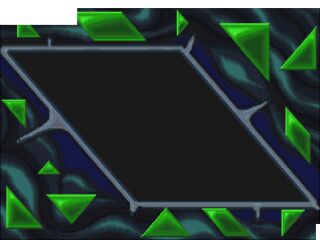 |
| Solution | Solution |
A 3 x 5 slider puzzle with two unused pieces (positions I and L) made more difficult because the puzzle extends beyond the viewport boundaries.
Layout:
A B C D E 1
F G H I J 2
K L M N O 3
4
Hourglass
Mode Position Optimum Solution
Beginner D CABGFKEHIDJL 3 1L 1L 4L 1L 2R 4R 2L 4L 2L 4L
K AHEBFJDKICGL 1R 4R 1L 1L 4L 1R 2R 4L 3 2L 2L 4L 3
J FCKAEDBHIGJL 3 2L 4R 1L 1L 4L 2R 4R 1R
A GCHBEDAKIFJL 3 2R 4L 2L 4R 2L 1L 4R 1L 2R 4L
Advanced J FHEDJACBIGKL 3R 1L 3L 4R 2L 2L 1R 4L 2R 4L
A GCFJEDKHIBAL 4L 1L 1L 4L 3L 1L 4L 1L
D BEKGAJDCIFHL 4L 2L 2L 1R 3R 2L 4R 1L 4L 1L 3R
K FCBDEJAKIHGL 2R 4L 3R 1L 3L 2L 4L 1R 3R
Expert A GEAJDKHBIFCL 1R 2 1R 2 3R 4R 1L 2 3R 1R 3R
D DBKGFAJHIECL 1L 4L 1R 1R 2 4R 1L 4R 1R 4L 3L
K DEAFHJKBICGL 4L 1R 1R 1R 4R 1R 3L 1L 2 3R 1L 4L
J FDCKBEJHIGAL 1L 3L 4R 1R 1R 3R 4R 1R 4L 2 1L
Puzzle 3-11
A cryptogram puzzle with various letter patterns on a cavern wall:
Beginner mode:
#### # ### ##### # ###### ## ## ###
###### ## ## ##### ### ### #### ###### ###
####### ## ###### ### ## ###### ## ###### #####
### ######## #### ###### ### #### ## ## #### ######
## ### #### #### ### ### ######### #### # ###
####### #### ####### ### ##### #### ##### ### ##
###### ### #### ####### ### ####
Solution Solution Solution Solution
Advanced mode:
### ##### #### #### ##### ## # # ####
#### #### #### ##### ######### ##### ####
##### #### ## ### #### #### ####### ## ## ####### ##
##### ##### ## ########### ##### ## ### #### #####
##### ## ### ###### ## ## ####### ##### ### ######
#### ##### ###### ## # ###### ### #### ######
###### ##### ### #### #### ### ## ###
Solution Solution Solution Solution
Expert mode:
# ###### # ###### ### ###### ## ### ####
#### ###### #### ###### ## ####### ## #######
### ## # ##### ## #### ##### #### ######### ### ######
### ##### ##### #### ### #### # ##### ######## ####
######## ### ########## ## ### #### ## ### ##### ##
### ###### ### ######### ## #### #### #### ####
######## ######## ### ##### #####
Solution Solution Solution Solution
A Simon Says puzzle involving a cavern.
| Beginner mode: | 21 symbols |
| Advanced mode: | 27 symbols |
| Expert mode: | 33 symbols |

Open image in separate window for printing
Original objects:
1 2 3 4 5
6 7 8 9 10 11 12
Intermediate object sequence:
Barnacle
Purple egg
2 chickens
Cornucopia
Hairy claw
Warts
Brain
Y-head
2-headed lizard
Mode Solution Sequences
Beginner 3 4 5 6 8 9 10 12 11 2 1 7
1 2 3 5 8 9 10 12 4 11 6 7
2 3 5 6 8 9 10 11 1 4 12 7
2 3 4 5 9 10 11 12 6 1 8 7
1 2 4 5 8 9 10 11 12 6 3 7
1 2 3 4 6 9 10 11 8 12 5 7
1 2 4 5 6 9 11 12 3 8 10 7
1 2 4 6 8 10 11 12 5 3 9 7
1 3 4 6 8 9 11 12 10 5 2 7
1 2 3 4 5 6 8 12 9 10 11 7
1 3 5 6 8 10 11 12 2 9 4 7
Advanced 4 5 8 9 10 11 1 2 12 6 3 7
1 2 3 9 10 4 6 11 8 12 5 7
2 5 6 9 11 1 12 4 3 8 10 7
2 4 10 11 12 6 8 1 5 3 9 7
1 4 8 9 11 12 3 6 10 5 2 7
1 2 3 4 6 8 5 12 9 10 11 7
1 5 6 11 12 3 10 8 2 9 4 7
4 6 8 10 12 5 9 3 11 2 1 7
1 3 8 9 12 10 2 5 4 11 6 7
2 3 5 6 8 9 11 10 1 4 12 7
3 5 10 11 12 2 4 9 6 1 8 7
Expert 2 4 11 10 12 6 8 1 5 3 9 7
1 11 4 9 8 12 3 6 10 5 2 7
4 6 1 2 3 8 5 12 9 10 11 7
1 12 6 11 5 3 10 8 2 9 4 7
6 8 12 4 10 5 9 3 11 2 1 7
3 12 8 1 9 10 2 5 4 11 6 7
5 8 3 6 2 9 11 10 1 4 12 7
3 10 5 12 11 2 4 9 6 1 8 7
5 9 10 8 4 11 1 2 12 6 3 7
2 10 9 3 1 4 6 11 8 12 5 7
9 11 2 5 6 1 12 4 3 8 10 7
Copyright © 2004 Balmoral Software (http://www.balmoralsoftware.com). Portions copyright © 1995 Philips Interactive Media, Inc. All rights reserved. Republication, redistribution or conversion is expressly prohibited without the prior written consent of Balmoral Software.